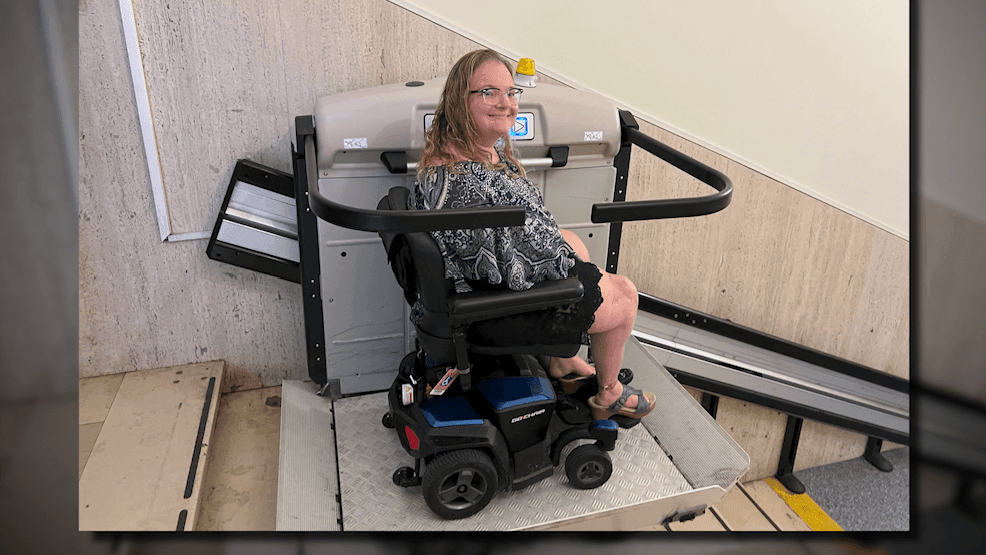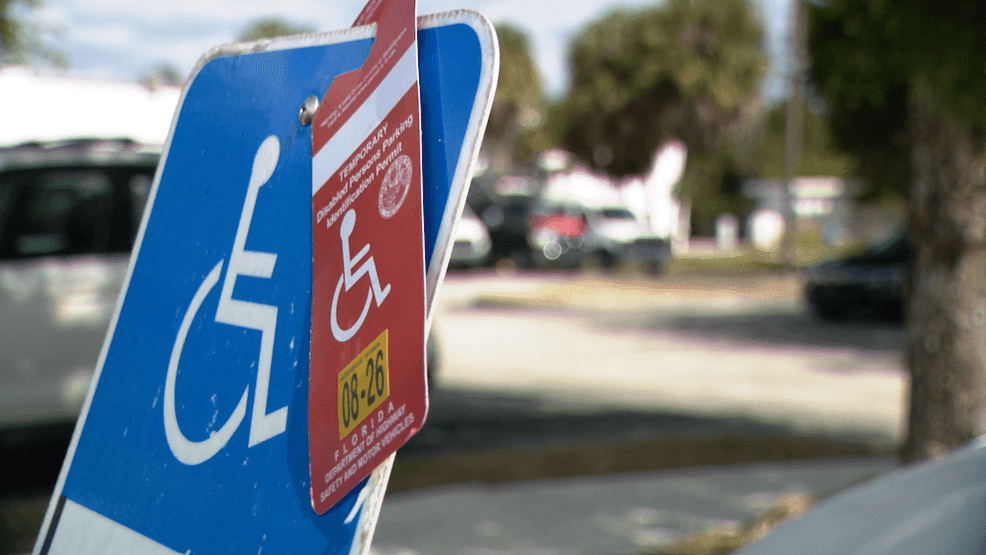STUART, Fla. (CBS12) — What started as a feel-good bill to help pregnant women avoid long walks in the Florida heat is now the subject of a federal lawsuit — one that could decide who really belongs in a handicapped parking space.
Olivia Keller says she gets it — Florida lawmakers wanted to make life easier for expectant mothers. But she told CBS12 News reporter Katie Bente that the change comes at a cost.
“Those accommodations don’t exist just to make our lives easier,” she said. “They exist to make our lives possible.”
Keller, 48, was born without arms and uses a power wheelchair and a van with a side ramp. She says accessible parking isn’t about convenience — it’s about survival.

What started as a feel-good bill to help pregnant women avoid long walks in the Florida heat is now the subject of a federal lawsuit — one that could decide who really belongs in a handicapped parking space. Olivia Keller, 48, was born without arms and uses a power wheelchair and a van with a side ramp. She says accessible parking isn’t about convenience — it’s about survival. (Olivia Keller)
“If I don’t park there, I literally can’t get out of my car,” she said. “That means I can’t get to work, I can’t go to the doctor, I can’t live my life.”
The law that sparked the debate
This summer, Florida began issuing red “expectant mother” placards — temporary disabled passes for pregnant women in their third trimester. With a doctor’s note confirming pregnancy, they can park in the same blue-lined spaces reserved for people with disabilities, for up to a year.
CBS12 News first covered the rollout of the new program in September, when the Florida Department of Highway Safety and Motor Vehicles started issuing the red placards statewide.
At the time, supporters told CBS12 the program was designed to give pregnant women a small comfort in Florida’s summer heat — especially for those late in pregnancy or juggling strollers and car seats.
Critics, however, warned that it could lead to fewer available spots for people with disabilities, since the law didn’t add new spaces — it simply expanded who could use the existing ones.
During a March committee hearing, bill sponsor Rep. Fiona McFarland (R-Sarasota) recalled being nine months pregnant in Florida’s heat, waddling past empty handicapped spots. She said she simply wanted to help women like her park closer to store entrances.
“Pregnancy is not a disability,” McFarland said at the time. “I just want to be able to park up front.”
Gov. Ron DeSantis signed the measure in June, and FLHSMV rolled it out July 1.
The legal challenge
Keller, represented by attorney Matthew Dietz and Nova Southeastern University’s Disability Inclusion and Advocacy Law Clinic, argues that violates federal law.
“What the state cannot do,” Dietz said, “is enact a law that lessens the protections for people with disabilities provided by federal law — and that’s exactly what the state did.”
See also: Florida AG accuses Microsoft of discrimination against faith-based nonprofits
He points to federal standards that require a minimum number of accessible spaces in every public lot. If those spots are now shared with people who aren’t disabled under the Americans with Disabilities Act, he says, access for disabled drivers is being diluted.
“It’s not about numbers on paper,” Dietz said. “It’s the difference between being part of your community and being shut out of it.”
The lawsuit, Keller v. Florida Department of Highway Safety and Motor Vehicles, filed Oct. 27 in federal court, asks a judge to stop the state from issuing the red placards and to revoke those already distributed.
A question of fairness
Keller says her lawsuit isn’t about pitting one group against another — it’s about preserving accessibility.
“I empathize with pregnant women,” she said. “If someone has a complicated pregnancy, they were already eligible to park in disabled spaces. This is putting convenience above need.”

What started as a feel-good bill to help pregnant women avoid long walks in the Florida heat is now the subject of a federal lawsuit — one that could decide who really belongs in a handicapped parking space. Olivia Keller, 48, was born without arms and uses a power wheelchair and a van with a side ramp. She says accessible parking isn’t about convenience — it’s about survival. (WPEC){ }
But not everyone agrees the new law goes too far. Supporters argue that pregnancy brings legitimate mobility challenges and that the permits are temporary — lasting only up to a year — while permanent disabled placards remain valid indefinitely.
Some Florida lawmakers have said they see the program as an expansion of compassion, not a reduction in access.
What happens next
The case could force Florida to choose between keeping the new law or redrawing thousands of parking lots statewide to create separate “expectant mother” spaces — a cost lawmakers may have to weigh in a future session.
For Keller, the fight is personal.
“Sometimes people think, ‘Well, I’m just hot and tired,’” she said. “But heat exhaustion isn’t the same as being hot. And a 300-pound power chair isn’t the same as a stroller.”

